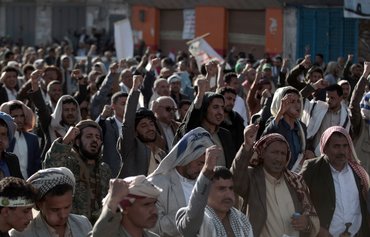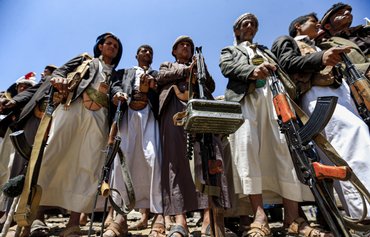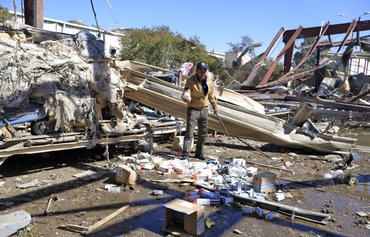ADEN -- A recent spate of assassinations targeting Houthi leaders and tribal loyalists carried out by rival factions of the Iran-backed militia points to vicious and escalating infighting within the group, analysts said.
The perpetrators of these murders, which have included an ambush by gunmen and even hangings, seek to tip the balance within the militia in favour of leaders who hail from the group's heartland in Saada province, they said.
Houthi leaders from Saada province are at the top of the militia's hierarchy, enjoying a higher status than do leaders from Hashemite families in Sanaa and Dhamar, according to lawyer and human rights activist Abdul Rahman Barman.
Many of the Saada leaders received training in Iran and answer to the Islamic Revolutionary Guard Corps (IRGC).
![Fighters loyal to Yemen's Houthis stand guard in Sanaa on September 24 as the Houthis collect cash, food and other donations for their fighters. [Mohammed Huwais/AFP]](/cnmi_am/images/2021/07/12/30649-Yemen-Houthis-Sanaa-600_384.jpg)
Fighters loyal to Yemen's Houthis stand guard in Sanaa on September 24 as the Houthis collect cash, food and other donations for their fighters. [Mohammed Huwais/AFP]
It recently came to light that the October 27 killing of Houthi leader Hassan Zaid in Sanaa resulted from a death sentence issued by the militia.
Gunmen firing at his car killed Zaid as he passed through a tunnel in the Haddah area of Sanaa province. At the time, the Houthis blamed unknown armed men.
But on June 22, the victim's brother, Abbas Zaid, shared online the text of a report he had submitted to the Public Prosecution, in which he claimed the Houthis had committed the crime themselves.
He said a Houthi official had "boldly admitted that my brother Hassan was assassinated pursuant to a belated death sentence issued by them".
In a separate incident on May 7, photos published by various media outlets showed Houthi field commander Abdullah al-Abbasi hanging from a tree in Wadi Zubaid in Hidan district, Saada province.
He was killed after responding to a summons by one of the group's supervisors.
Sources online said al-Abbasi had been executed as a result of internal disputes within the group and noted that he hailed from al-Bayda province, while his killers were leaders in Saada province.
In yet another incident, local media outlets reported that on March 12, the Houthis killed Sheikh Muhammad Askar Abu Shawareb -- a Hashd tribal elder --after storming his house on al-Matar street in northern Sanaa.
The perpetrators then burned his body in a room of his house.
Abu Shawareb hailed from Amran province's Kharif district.
Less than a month earlier, the Houthis killed loyalist Sheikh Hizam Abu Nastan, along with three of his sons and his sister, in al-Rawda in northeastern Sanaa.
Exploited and killed
The Houthis have a history of forging political and social alliances, said Abaad Centre for Research and Studies director Abdulsalam Mohammed.
But after they have leveraged these relationships to their own advantage, someone who helped them always ends up getting killed, he said.
The Houthis initially formed alliances with the General People's Congress (GPC) and with tribal leaders, he said, "and when the role of these allies ended with the militia's entry into Sanaa, it started liquidating the tribal and GPC leaders".
One motive for the Houthis' assassination of tribal leaders is that some sheikhs are loyal to a specific faction within the militia, and this can cause friction, political analyst Waddah al-Yaman Abdul Qader said.
Each faction tries "to weaken the other through the sheikhs loyal to it", he said, noting that the assassination of influential tribal leaders from rival wings can tip the balance in favour of the perpetrators' faction.
Another motive is that the Houthis regard their allies as a "heavy burden", whose "demands and interests grew in proportion to the importance of their presence on the battlefield and their ability to mobilise the tribes", he said.
The Houthis seek "to get rid of them once their task concludes" and replace them with new leaders "in order to ease their obligations towards them", he added.
According to political analyst Mahmoud al-Taher, many of the tribal leaders who supported and assisted the Houthis at the beginning, during their 2014 coup against the state, have met with a tragic and untimely end.
They have been assassinated in "criminal operations" that the so-called Preventive Security Service, a Houthi-created intelligence agency that receives direct support from the IRGC, usually carries out, he said.
The Houthis' actions are the best evidence that the militia has been focused on excluding others from power, he said.
"The Houthis' killing of the sheikhs loyal to them is a long-standing tactic for them, and not a product of the moment," al-Taher said.
IRGC 'leads the scene'
Abdul Qader pointed to an internal rift that primarily stems from a conflict with the Hashemite families, who resent having the al-Houthi family rule over them.
As internal rivalries fester, Iran's ambassador to the Houthis, Hassan Eyrlou, has been overseeing the process of empowering the IRGC in Sanaa.
The escalation of disputes between the rival families "prompted Iran to dispatch Eyrlou", who is acting as a de facto governor of Houthi-controlled areas and is directing the group's military campaign to seize Marib, Abdul Qader said.
Eyrlou is a "direct link to the Iranian regime, which leads the scene", he said.
According to Mohammed, Eyrlou came to manage specific issues that are complicating the Houthis' calculations, including the recent deaths of Yahya al-Shami, assistant supreme commander of the Houthi forces, and his son Zakaria.
Al-Shami was a key figure in the militia who was widely regarded as "the engineer of the coup in Sanaa", Mohammed said, while his son occupied a prominent position as the Houthis' minister of transport.
Both lost their lives earlier this year to COVID-19, which the Houthis have downplayed and exploited in order to raise funds for their war chest.

![A Yemeni man holds up a Kalashnikov assault rifle with a flag sticking from its barrel showing a picture of Houthi leader Abdulmalik al-Houthi, during a tribal meeting in Sanaa on September 21, 2019. [Mohammed Huwais/AFP]](/cnmi_am/images/2021/07/12/30650-Yemen-Houthi-soldier-600_384.jpg)







Good!
Reply1 Comment(s)